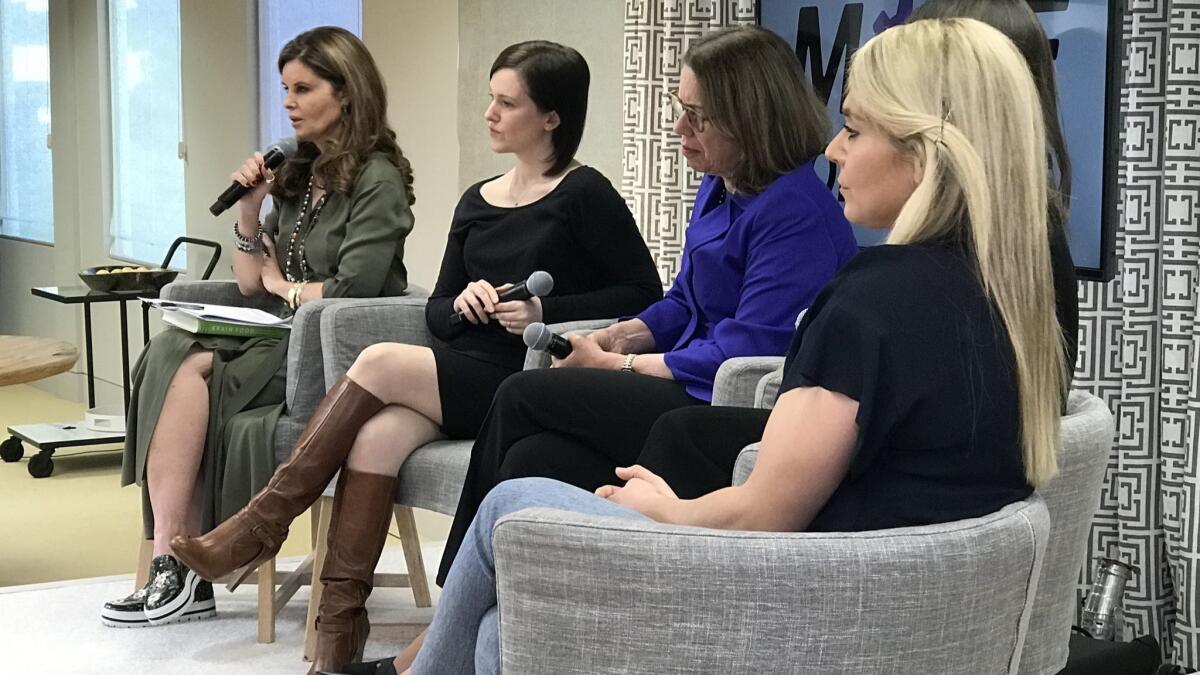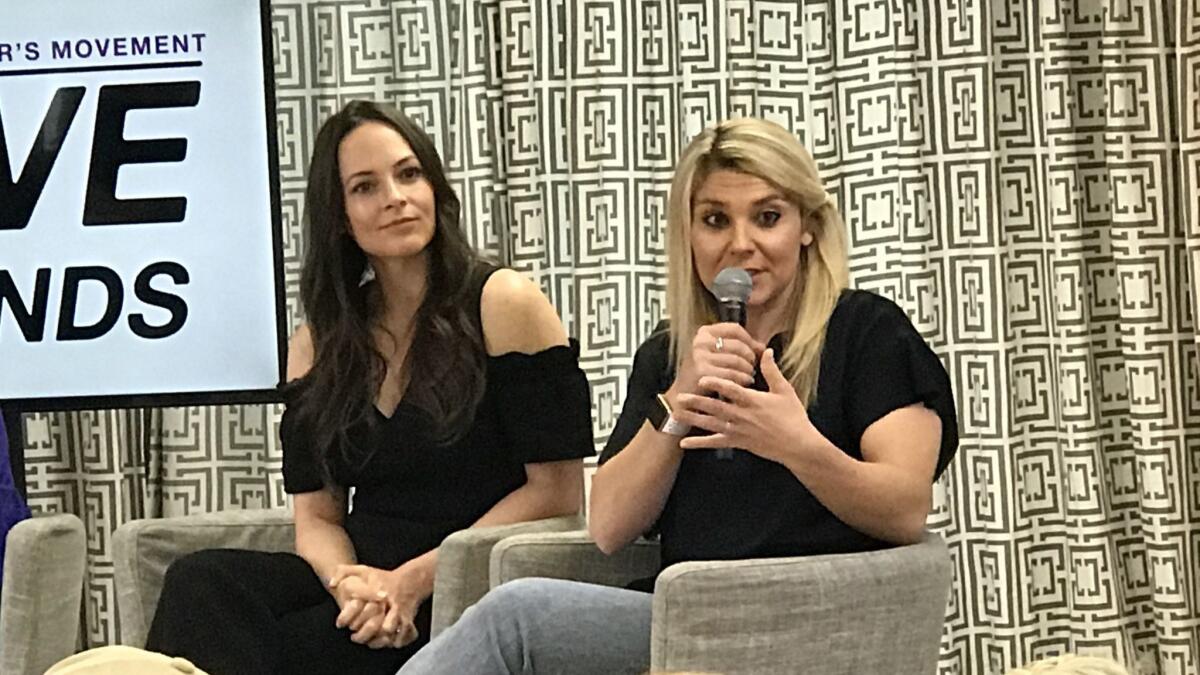Column: How to avoid losing your mind to Alzheimer’s or dementia. Hint: Start now, says Maria Shriver

- Share via
The most disturbing thing I heard recently about the prevention of Alzheimer’s disease and dementia was a comment made by Maria Shriver, the former first lady of California who founded the Women’s Alzheimer’s Movement after discovering the disease affects twice as many women as men.
It would seem, Shriver said, that we have all become so obsessed with our bodies that we have forgotten to take care of our brains: “I was speaking to the head of neurology up at Stanford who said ‘My waiting room is filled with 70-year-olds with the bodies of 40-year-olds and no minds.’”
Is that a chilling image, or what?
I don’t know anyone whose family has not been affected by dementia. I don’t know anyone my age who hasn’t worried at least a little about memory loss. Misplacing your keys is not the same as forgetting where you are, of course, but we are right to be concerned.
Shriver, a journalist, was moderating a panel that included a neuroscientist who is a food expert, a psychiatrist who is a sleep expert, a fitness trainer who is a pediatric ICU nurse and a nutritionist with a high-profile patient roster.
They had gathered at her Brentwood offices to promote an initiative called Move for Minds and to discuss what we know about Alzheimer’s prevention.
“This is a disease that is in your brain 20 years before you are symptomatic,” said Shriver, whose father — diplomat, politician and Peace Corps founder Sargent Shriver — was diagnosed with Alzheimer’s in 2003 at age 87. He died eight years later, his mind and memory gone.
“So you’re never too young to start thinking about your brain health,” Shriver said, “and what your brain needs to survive and thrive.”
::
No one is sure why more women are affected by Alzheimer’s than men.
It might have to do with hormones, and changes that occur as a result of menopause and the years leading up to it, during which time levels of estrogen begin to plummet.
“As estrogen declines, it leaves the brain a little bit unprotected and vulnerable to everything else — sleep deprivation, lack of exercise,” said neuroscientist Lisa Mosconi. “When women are in their 40s, their brains really start to look like they are aging faster than the brains of men who are exactly the same age.”
::
Here is the short version of what you need to know about what experts think is the best way to reduce the risk of dementia and its various cousins:
Get plenty of exercise. Sleep a lot (but don’t use pills). Eat well (cut out processed foods, and unless you have a medical condition, stop being a jerk about gluten). Drink tap water (unless you live in Flint, Mich.).
“If I could tell people any one thing to prevent or push off dementia,” Shriver said, “it would be exercise.”
Exercise increases blood flow to the brain, which brings oxygen, which helps prevent the dreaded “brain fog” that so many women complain about once they reach a certain estrogen-deprived age.
“We’ve detached our brains from our bodies in this country,” said Anja Garcia, who teaches fitness classes at Equinox Fitness. Shriver has partnered with Equinox for half-day events in Los Angeles, San Francisco, New York and Boston in June that will combine an exercise class with a discussion about Alzheimer’s prevention.
Garcia teaches classes that combine high-intensity interval training with exercises that require coordination and stability, she said, “so you aren’t mindlessly going through the movement.”
Ruth Benca, a UC Irvine psychiatrist and expert on sleep and brain health, said at least 15% of dementia is directly related to sleep disturbance and sleep problems.
Happily, she said, these are treatable issues.
In addition to the right kind of diet, meditation and exercise, she said, it is commonly accepted that the first-line treatment for insomnia is cognitive behavioral therapy, a form of talk therapy that focuses on developing coping strategies to combat self-defeating thoughts.
As someone whose personal food demons can be summed up in three words — Scotch and Snickers — I was alarmed to learn that elevated blood sugar and pre-diabetes can double your chance for dementia and Alzheimer’s.
“Research has shown that some food will help us age gracefully and keep our mental faculties intact, whereas others increase the risk of dementia substantially,” said Mosconi, author of “Brain Food: The Surprising Science of Eating for Cognitive Power.”
“In the same way that we save for retirement,” she said, “we should really start to eat for retirement.” (Farewell, Snickers. It was fun while it lasted.)
The brain has different dietary needs than the body. “If you eat right for your brain,” Mosconi said, “you are eating right for your body, but not necessarily the other way around.”
So, for example, said nutritionist Kelly LeVeque, plain steamed broccoli might help you lose weight, but its antioxidant properties won’t do much for your brain unless you add a healthy fat like olive oil.
“There were years when people were totally terrified of fat,” LeVeque said, “but every day I am banging my little drum: You need the fat on the salad or you are not absorbing the fat-soluble nutrients.”
Speaking of food fads, there is no evidence that gluten is bad for the brain, Mosconi said. However, two kinds of people should avoid it: the 1% of the population that has celiac disease and the estimated 6% that has “non-celiac gluten sensitivity.” Get tested to find out.
“I feel that sometimes we treat science a little bit like fashion,” Mosconi said. “A few years ago, everybody was vegan. And now everybody is eating fat. But science moves slower. By the time we do a clinical trial that shows gluten is bad for you, everybody will be eating it again.”


Twitter: @AbcarianLAT







